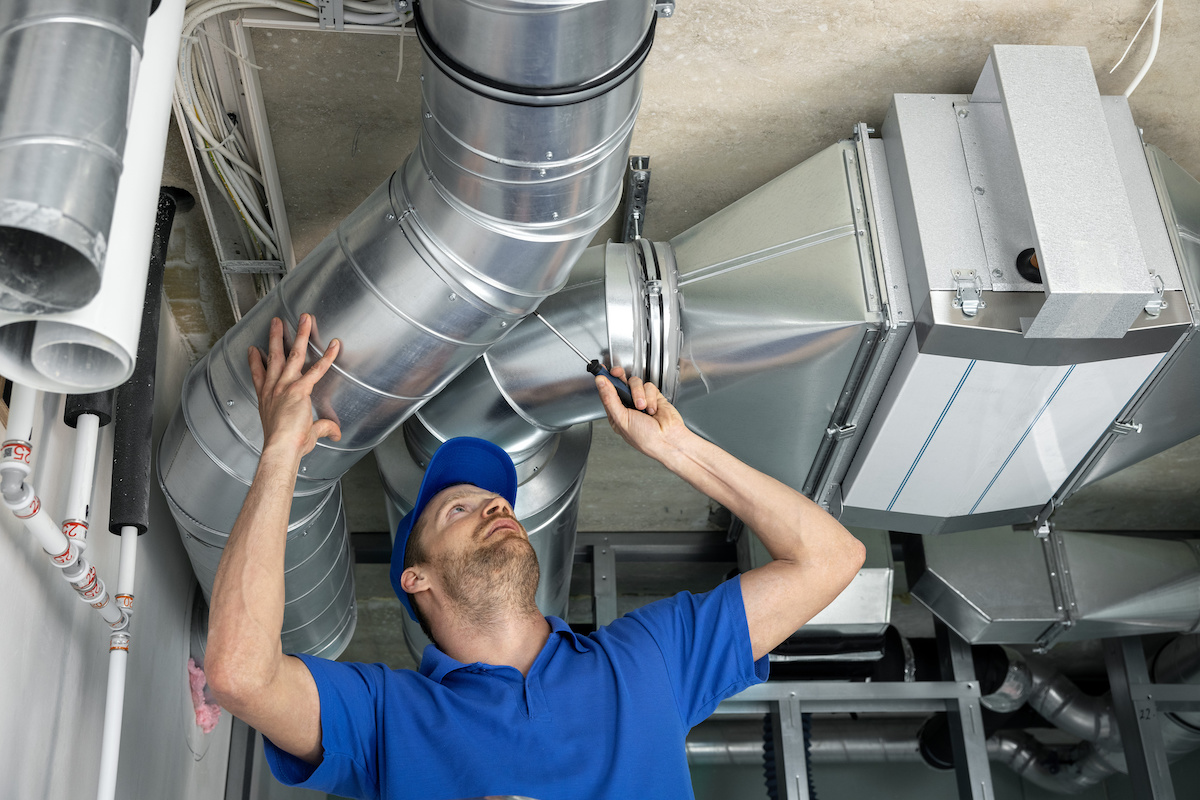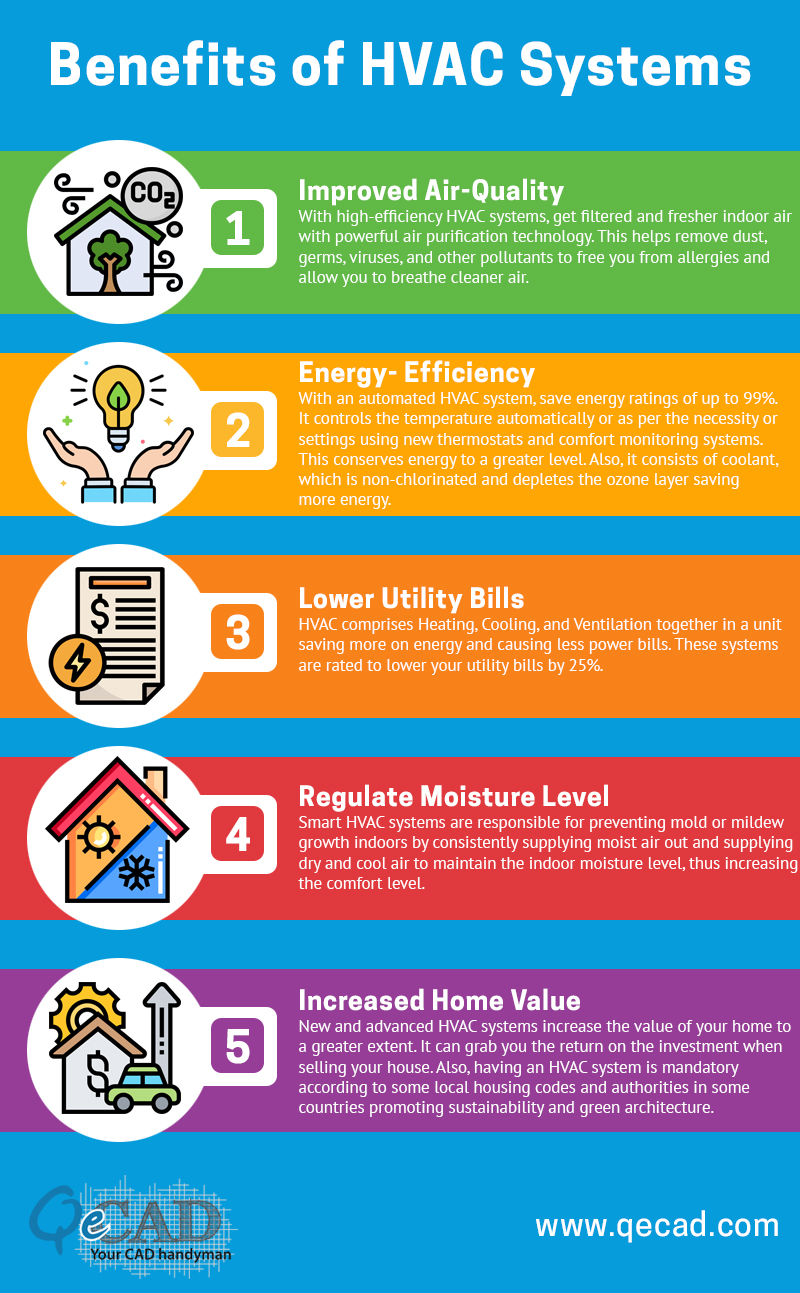HVAC System Health Benefits
by Admin
Posted on 15-01-2025 02:39 PM

Improved Air Quality
One of the primary functions of an HVAC system is to circulate and filter the air within a building. Airborne pollutants such as dust, pollen, mold spores, and volatile organic compounds (VOCs) can accumulate over time, leading to poor indoor air quality. A high-efficiency HVAC system equipped with advanced filtration can significantly reduce the concentration of these pollutants, creating a cleaner and healthier living or working environment.
Reducing Allergens
Allergens like pollen, pet dander, and dust mites can trigger allergic reactions and exacerbate symptoms for individuals with asthma and other respiratory conditions. By filtering out these allergens, an HVAC system can help alleviate allergy symptoms, reduce the frequency of asthma attacks, and improve overall respiratory health.
Eliminating VOCs
Volatile Organic Compounds (VOCs) are chemicals emitted from various household products, including paints, cleaning agents, and furniture. Prolonged exposure to VOCs can cause a range of health issues, from headaches and dizziness to more severe conditions like liver damage and cancer. HVAC systems with advanced air purifiers and carbon filters can effectively remove VOCs from the air, ensuring a safer and more comfortable living space.
Enhanced Respiratory Health
Poor indoor air quality can have a detrimental impact on respiratory health. Dust, mold, and other airborne particles can irritate the respiratory system, leading to coughing, wheezing, and shortness of breath. A well-maintained HVAC system can significantly improve air quality by filtering out these irritants, thereby reducing the risk of respiratory issues.
Preventing Respiratory Infections
Bacteria and viruses can thrive in poorly ventilated environments, increasing the likelihood of respiratory infections. HVAC systems with UV light technology can kill or inactivate these microorganisms, reducing the spread of infectious diseases and promoting a healthier indoor environment.
Managing Humidity Levels
High humidity levels can create a breeding ground for mold and mildew, which can trigger respiratory issues. On the other hand, low humidity can dry out the respiratory tract, making it more susceptible to infections. An HVAC system with humidity control capabilities can maintain optimal humidity levels, ensuring a balanced and comfortable living space.
Reduced Risk of Mold and Mildew
Mold and mildew are common indoor pollutants that can cause a range of health problems, including allergic reactions, respiratory issues, and skin irritation. High humidity levels and poor ventilation are major contributors to mold growth. A properly functioning HVAC system can help control humidity levels and prevent the accumulation of moisture, thereby reducing the risk of mold and mildew.
Identifying and Addressing Moisture Sources
Regular maintenance of the HVAC system can help identify and address moisture sources, such as leaks or condensation. By addressing these issues promptly, you can prevent the conditions that favor mold growth and ensure a healthier living environment.
Using Dehumidifiers
In areas with high humidity, using a dehumidifier in conjunction with the HVAC system can further reduce the risk of mold and mildew. Dehumidifiers remove excess moisture from the air, creating a less favorable environment for mold spores to thrive.
Increased Comfort and Productivity
A comfortable indoor environment is essential for both physical and mental well-being. Temperature and humidity levels that are too high or too low can cause discomfort, leading to decreased productivity and increased stress. A well-maintained HVAC system can maintain optimal temperature and humidity levels, creating a more pleasant and productive living or working space.
Temperature Control
The ability to regulate temperature is one of the most obvious benefits of an HVAC system. Whether it's keeping your home cool during hot summer months or warm during cold winters, a reliable HVAC system ensures that you and your family are comfortable year-round.
Humidity Control
Maintaining the right humidity levels is equally important for comfort. High humidity can make the air feel sticky and uncomfortable, while low humidity can cause dry skin and static electricity. An HVAC system with humidity control features can create a balanced and comfortable environment, enhancing your overall well-being.
Energy Efficiency and Cost Savings
An efficient HVAC system not only improves health but also reduces energy consumption, leading to significant cost savings. Modern HVAC systems are designed to operate at optimal efficiency, using less energy to maintain comfortable temperatures and air quality. This not only helps the environment but also reduces your utility bills.
Regular Maintenance
Regular maintenance is crucial for ensuring the efficiency of your HVAC system. Routine inspections and cleanings can identify and address issues before they become major problems, preventing unnecessary energy waste and extending the lifespan of your system.
Upgrading to Energy-Efficient Models
If your HVAC system is outdated, consider upgrading to a more energy-efficient model. Modern systems come with advanced features like variable speed motors and smart thermostats, which can significantly improve energy efficiency and reduce operating costs.
Improved Sleep Quality
A comfortable and healthy indoor environment is essential for a good night's sleep. Poor air quality, uncomfortable temperatures, and high humidity levels can disrupt sleep patterns and affect overall sleep quality. By maintaining optimal air quality and temperature, an HVAC system can create a more conducive environment for restful sleep.
Reducing Noise Pollution
Excessive noise can be a significant barrier to sleep. Some modern HVAC systems come with quiet operation features, ensuring that they do not disturb your sleep. Additionally, proper insulation and ductwork can further reduce noise levels, creating a peaceful and restful environment.
Maintaining Optimal Temperature
The temperature of your sleeping environment can significantly impact your sleep quality. An HVAC system can maintain a consistent and comfortable temperature throughout the night, helping you fall asleep faster and stay asleep longer.
Reducing Stress and Anxiety
A clean and comfortable indoor environment can have a positive impact on mental health. Poor air quality and uncomfortable temperatures can increase stress and anxiety levels, making it difficult to relax and unwind. By creating a healthier living space, an HVAC system can help reduce stress and promote a sense of well-being.
Creating a Peaceful Environment
A well-maintained HVAC system can create a peaceful and serene environment, free from the irritants that can cause stress and anxiety. By filtering out pollutants and maintaining optimal temperature and humidity levels, you can create a space that promotes relaxation and mental clarity.
Enhancing Overall Well-Being
The cumulative effects of improved air quality, temperature control, and reduced stress can lead to enhanced overall well-being. A healthy indoor environment can boost your mood, improve your cognitive function, and enhance your quality of life.
FAQs
What are the signs that my HVAC system needs maintenance?
Some common signs that your HVAC system needs maintenance include unusual noises, reduced airflow, increased energy bills, and frequent breakdowns. If you notice any of these issues, it's a good idea to schedule a professional inspection and maintenance.
How often should I replace the air filter in my HVAC system?
It's generally recommended to replace the air filter every 1-3 months, depending on the type of filter and the level of indoor pollutants. For households with pets or allergy sufferers, more frequent filter changes may be necessary.
Can an HVAC system help with seasonal allergies?
Yes, an HVAC system with advanced filtration can help reduce allergens like pollen, pet dander, and dust mites, which can trigger seasonal allergies. Regular maintenance and the use of high-efficiency filters can further improve air quality and alleviate allergy symptoms.
What is the ideal indoor humidity level?
The ideal indoor humidity level is typically between 30% and 50%. Maintaining this range can prevent the growth of mold and mildew while also keeping the air comfortable and healthy.
How can I improve the energy efficiency of my HVAC system?
To improve the energy efficiency of your HVAC system, consider regular maintenance, upgrading to energy-efficient models, sealing and insulating ducts, and using a programmable thermostat. These steps can help reduce energy consumption and lower your utility bills.
Are there any eco-friendly HVAC options available?
Yes, there are several eco-friendly HVAC options available, including geothermal systems, solar-powered systems, and high-efficiency heat pumps. These systems are designed to be more energy-efficient and have a lower environmental impact, making them a great choice for environmentally conscious consumers.
Just Rite Air
28015 Smyth Dr Suite 116, Santa Clarita, CA 91355
(661) 779-4499
Info@JustRiteAir.com
